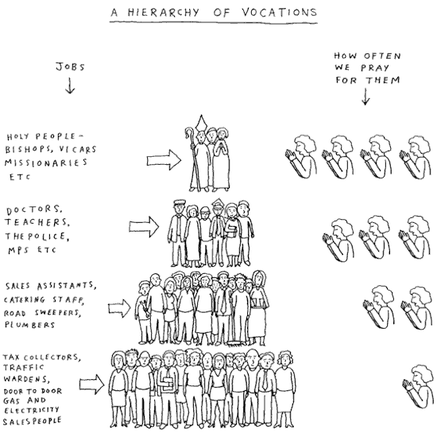 In his first letter to the Gentiles of Asia Minor, who at the time were suffering religious persecution, St. Peter offers advice counselling steadfastness and perseverance. In I Peter Chapter 2, Verse 9 he writes “You are a chosen race, a royal priesthood, a holy nation, God’s own people, in order that you may proclaim the mighty acts of him who called you out of darkness into his marvellous light.” It is easy to glance over such passages thinking ‘they do not apply to me’ as the language appears deeply exclusive talking of an chosen race and language like ‘priesthood’ has come to refer to those called to a particular vocation: ordained ministry in the Church. As in the cartoon, we certainly seem to pray for certain people and their ministry more than others. But St. Peter is actually talking of the gift and call of the Baptism of all believers. This is of course not to say that presbyters do not have particular gifts and talents that suit them to that ministry, but that they are not somehow ‘special’. I recall the Methodist theologian C. K. Barrett preaching on this text once commenting that all the presbyters he had ever met had had noses, but so, in fact, had every person he had ever met. In what at the time was a ground-breaking document, All are Called published in 1985, the Church of England Board of Education commented because all human beings are made in the image of God, they are called to become the People of God, the Church, servants and ministers and citizens of the Kingdom, a new humanity in Jesus Christ. Though we are tainted by our sinfulness, God’s wonderful grace and love offer us all this common Christian vocation. God leaves everyone free to refuse this call; but the call is there for all without exception. All the Christian Churches in Britain continue to be tainted by the arguments and discussions over the place of women and homosexuals in ministry, and this topic has again been in the news recently. However St. Peter is clear all Christians are called to work for the enlarged realisation of the Kingdom of God. This begins in the Church but extends to the family, to the workplace and to the community. The young are called, the elderly are called, the healthy are called, the sick are called, those who work for the Church are called and those who work in local government or as car salespeople are called. All are called. Of course caution has to be exercised when we use this term ‘vocation’ and the Chair of the West Yorkshire District of The Methodist Church, Rev’d. Dr. Roger Walton, has a salient remainder in his recent book The Reflective Disciple: In a society where some work is still exploitative and some experiences of ordinary living are degrading, we need to be careful before baptizing everyone’s daily experience with the word vocation, simply because they are disciples. That does not mean that in any of those settings one cannot carry a sense that one is there to work with God, perhaps especially to express love and support, to resist dehumanising, to seek for justice or simply to offer a smile to help strugglers survive. In much discussion of vocation the emphasis is on choosing a path, a role or career to serve God but the only choice open for some people may be how, not whether, to live in this way. Vocation in this context is the fundamental vocation of all Christians to be with God and in practice will mean owning that it is a place where God shares people’s experience and wants us with him to bring some light and hope. The imprisonment of the Kingdom of God to a Sunday or to Church is an attempt to restrict the description of God’s activity to the ecclesiastical sphere of our lives. Christ the King is Lord of the entire world and, as the Good Shepherd, cares for all its people. Vocations Sunday is marked in most churches on the fourth Sunday after Easter and this year falls on 29th April. It is not just an opportunity for Christians to think about what functions they perform in the Church they attend, but it is an opportunity also to reflect on how in simple ways and through everyday experiences they can share something of Christ with others. Matthew With thanks to Mr. Dave Walker of Cartoon Church for kind permission to re-produce the cartoon A Hierarchy of Vocations. Comments are closed.
|
Pastoral LettersWritten by the Minister & Members
|
 RSS Feed
RSS Feed